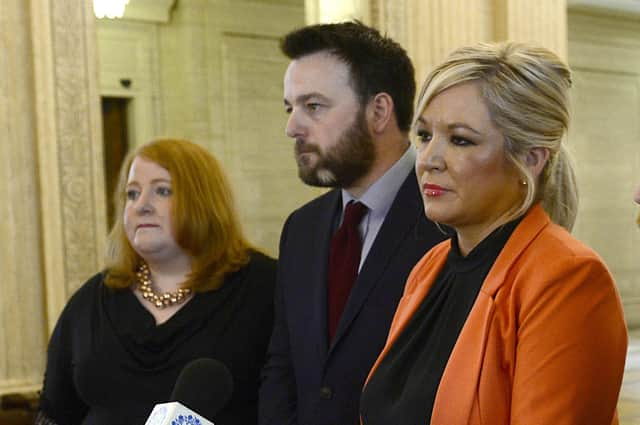Owen Polley: The pro EU parties might disagree on the Troubles but they share a contempt for unionists


The new ‘leader of the opposition’, the SDLP’s Matthew O’Toole, lectured the DUP about the supposed triviality of its concerns over an Irish Sea border.
Meanwhile, we learned that the aspirant first minister, Michelle O’Neill, told the BBC she believes there was ‘no alternative’ to the IRA’s violence during the Troubles.
Advertisement
Hide AdAdvertisement
Hide AdThese two interventions, by the parties spearheading Irish separatism in Northern Ireland, revealed a lot of what many unionists regard as wrong about the current political scene. They also exposed some ripe ironies.
In the Assembly elections, the SDLP failed to win enough seats to entitle it to nominate a Stormont minister. Nevertheless, it wanted to portray its ‘decision’ to oppose an executive that does not yet exist as brave and responsible, rather than an act of necessity and desperation.
The SDLP holds 8% of the seats in the Assembly, so, under legislation introduced by the former independent unionist MLA, John McCallister, it was permitted to form an ‘official opposition’. It could either accept this role, along with the political posts and funding it carried, or join an unofficial opposition that had none of these benefits.
It was understandable that the party tried to spin its struggle for relevance as a strength, but the implication that unionists are obsessed with constitutional minutiae, while people suffer as a result, is as condescending and hypocritical as it is implausible.
Advertisement
Hide AdAdvertisement
Hide AdLast week, the Bank of England set out in alarming terms how it expects living standards to drop and the economy to stagnate over the next few years.
The SDLP, alongside Sinn Fein and Alliance, will tell you that a working Stormont executive would ease this crisis for people in Northern Ireland. They also imply that the protocol will not cause higher prices and inflation.
In fact, not only do the assembly parties have few ideas, or powers, that could make a difference to the cost of living; the Bank of England’s statement shows just how immaterial local politicians are to an economic tsunami that is national and international.
One of the main triggers for inflation, or rising prices, is that the supply of goods struggles to meet public demand. The bank put interest rates up last week specifically to encourage people to save their money rather than spend it, in the hope that demand would fall. It’s a recognition that, at the moment, inflation has to be dealt with, even if that risks restricting potential growth in the economy.
Advertisement
Hide AdAdvertisement
Hide AdIn Northern Ireland, this is particularly relevant, because the protocol has increased the cost of selling goods here for companies in Great Britain. Many of them have stopped supplying us altogether, and retailers are forced to look elsewhere for suppliers. Even if a small number of local businesses can cash in, that means rising prices for customers. And the process will be put on steroids if, as the EU demands, the sea border is implemented ‘rigorously’.
The government’s ‘grace periods’, which suspended certain protocol checks and paperwork, particularly for food and parcels, may be the only thing preventing an inflationary disaster here.
None of this, of course, is recognised by pro-EU parties. They continue to patronise unionists and dismiss their concerns about a sea border that restricts and diverts the supply of goods, as if it’s an irrelevance or even a benefit. And they still imply that the executive would do all sorts of wonderful things to make your life easier, if only it were allowed to return.
At the centre of this mindset, rather than genuine concern for Northern Ireland, are two separate ideological aims.
Advertisement
Hide AdAdvertisement
Hide AdNationalists want to decouple the province from the UK’s economy and politics and tie it more closely to the Republic, as a staging post toward an eventual Dublin takeover.
Alliance wants to preserve as close as possible a political and economic relationship with Brussels, even if that means loosening our links with the rest of the UK and reorientating our economy.
What these parties share is a contemptuous attitude to unionists when we are guided by the equally ideological, but far less socially disruptive and economically damaging, goal of preserving our place in the Union.
In the aftermath of David Trimble’s death, many commentators remarked on the importance he accorded the ‘principle of consent’ and the constitutional guarantee it offered that Northern Ireland would remain part of the Union. Nationalists and others may have signed up to that central tenet of the Belfast Agreement nominally, but they’ve never truly accepted that it had consequences.
Advertisement
Hide AdAdvertisement
Hide AdThe warped view of the past articulated by Michelle O’Neill sets Sinn Fein apart from the SDLP and Alliance. But they’re all equally willing to bend, warp and distort the principle of consent, to the point that the deal struck on Good Friday 1998 is becoming increasingly meaningless.